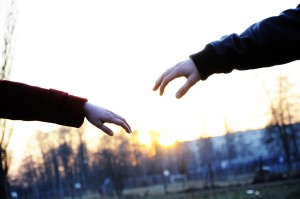
If you read the comments in the forums of Grief in Common, you’ll see that when grievers are given an opportunity to share their story, they will talk about who they lost, when it happened, and the circumstances surrounding the loss. And besides their grief the one thing that so many of these grievers have in common is the “end” of their story, where they say, “and now I just don’t know what to do…”
For some there is a “to-do” list on the other side of loss. The planning of the memorial service perhaps, or the settling of the estate. There are closets to be cleaned out, thank you cards to write and phone calls to be made. I find for most there is a paradox in the chores that follow loss. While tedious and tiresome, sad and somber, there’s still something to be said for the role these chores play in keeping a griever on track in the beginning, and the way that they keep the deceased in their daily life, plans and conversation.
But eventually everything on the to-do list gets crossed off and there’s nothing actually left to do, but grieve.
And what does that look like? Crying all the time? Pining, longing and yearning? Because in the beginning everything about the grieving is a verb, an action – something to do. But eventually there comes a point where that changes and it feels like a noun- a thing: the grief. And what’s a person “to do” with that?
Continue reading What To Do If You Don’t Know What To Do After Loss →
 Our worlds can become very small after the loss of a loved one. Grief can create blinders that make it hard to see past anything but our own pain and anguish. It can be challenging to get the help we need and to know how to be supportive…in the past we may have turned to friends and family when we’re hurting, but what happens when they’ve also been
Our worlds can become very small after the loss of a loved one. Grief can create blinders that make it hard to see past anything but our own pain and anguish. It can be challenging to get the help we need and to know how to be supportive…in the past we may have turned to friends and family when we’re hurting, but what happens when they’ve also been
 When I first started facilitating bereavement groups, I sort of assumed that people would be coming for help for “just” one loss. Of course one loss is more than enough…it’s already too much. Yet so many grievers I met were experiencing
When I first started facilitating bereavement groups, I sort of assumed that people would be coming for help for “just” one loss. Of course one loss is more than enough…it’s already too much. Yet so many grievers I met were experiencing 



 There’s no question that the loss of a loved one can be felt in every part of life, but what happens when your loss is hurting your relationship? If you have lost a loved one you know (all too well) the pain, confusion and anger that can come with it. Even if support is strong in the beginning, most grievers will say that typically the consoling fades with time. And it’s one thing to not feel comforted by those we expect it from, but even worse when it feels that the loss is starting to come between us. This can happen in so many ways…a woman who
There’s no question that the loss of a loved one can be felt in every part of life, but what happens when your loss is hurting your relationship? If you have lost a loved one you know (all too well) the pain, confusion and anger that can come with it. Even if support is strong in the beginning, most grievers will say that typically the consoling fades with time. And it’s one thing to not feel comforted by those we expect it from, but even worse when it feels that the loss is starting to come between us. This can happen in so many ways…a woman who 
 “I feel like I’m going crazy…” It’s a phrase I have heard from so many grievers. It can be just this feeling that brings someone to a support group after the loss of a loved one. There are many
“I feel like I’m going crazy…” It’s a phrase I have heard from so many grievers. It can be just this feeling that brings someone to a support group after the loss of a loved one. There are many 